
-
Find the right food for your petTake this quiz to see which food may be the best for your furry friend.Find the right food for your petTake this quiz to see which food may be the best for your furry friend.Featured products
 Mature Adult Dog Food
Mature Adult Dog FoodHill's Science Plan Mature Adult Multipack Wet Dog Food with Chicken & Beef are complete premium pet foods for mature adult dogs from 7 years. Your dog will love these deliciously smooth and savoury minced loaves, formulated to deliver the appropriate amount of energy to support the needs of adult dogs.
Shop Now Puppy Food
Puppy FoodHill's Science Plan Puppy Multipack Wet Dog Food with Chicken & Beef are complete premium pet foods for growing puppies from weaning until 1 year old and for pregnant and nursing dogs. Your puppy will love these deliciously smooth and savoury minced loaves, formulated for balanced nutrition and overall health.
Shop Now Adult Wet Dog Food with Beef
Adult Wet Dog Food with BeefHill's Science Plan Adult Multipack Wet Dog Food with Chicken, Beef & Turkey are complete premium pet foods for adult dogs from 1 year. Your dog will love these deliciously smooth and savoury minced loaves, formulated for balanced nutrition and overall health.
Shop NowFeatured products Light Adult Multipack Wet Cat Food with Chicken & Ocean Fish
Light Adult Multipack Wet Cat Food with Chicken & Ocean FishTender chicken chunks in gravy for cats, with L-carnitine and fewer calories for ideal weight management. Packed with high-quality protein, omega-6s, and vitamin E for shiny fur and healthy skin.
Shop Now Adult Multipack Wet Cat Food with Beef, Ocean Fish & Chicken
Adult Multipack Wet Cat Food with Beef, Ocean Fish & ChickenTender chunks in gravy for cats, with high-quality protein to maintain lean muscle. With vitamin E and omega-3s & -6s for healthy skin and balanced minerals to support healthy vital organs.
Shop Now Mature Adult Wet Cat Food with Chicken
Mature Adult Wet Cat Food with Chicken
Tender chicken chunks in gravy for mature adult cats. Made with easy-to-digest ingredients, high-quality protein for lean muscle maintenance and antioxidant vitamins C+E for optimal health.
Shop Now -
Dog
- Dog Tips & Articles
-
Health Category
- Weight
- Food & Environmental Sensitivities
- Urinary
- Digestive
- Joint
- Kidney
-
Life Stage
- Puppy Nutrition
- Adult Nutrition
- Senior Nutrition
Cat- Cat Tips & Articles
-
Health Category
- Weight
- Skin & Food Sensitivities
- Urinary
- Digestive
- Kidney
-
Life Stage
- Kitten Nutrition
- Adult Nutrition
Featured articles The Right Diet For Your Pet
The Right Diet For Your PetIn people, the right diet is very important. If you are eating the wrong way for your metabolism, activity level, age and lifestyle you could end up with health issues.
Read More Show some love with wet foods: a great choice for pets with health issues
Show some love with wet foods: a great choice for pets with health issuesShow some love with wet foods: a great choice for pets with health issues.
Read More The Incredible Science Behind Your Pet's Microbiome
The Incredible Science Behind Your Pet's MicrobiomeLearn what your pet's microbiome is, how it contributes to your pet's gut and overall health, and why nutrition is important in maintaining healthy microbiomes.
Read More -


You love your cat, but your furry friend certainly has an independent streak and can be quite feisty at times. You need to know how to discipline a cat, but you may not know where to start. Effectively disciplining a cat may take some trial and error. Just like all humans are different, so are all animals. While one may react positively to a certain style of correcting bad cat behaviour, others may reject your attempts and their behaviours may only get worse. Plus, there are some methods that you should absolutely not try while disciplining a cat.
The truth is that it's hard to know how to discipline a cat if you've never done it before, or if your previous cats seemed to learn the lay of the land all on their own. To get started on the right foot, it's important to know the dos and don'ts of how to discipline a cat in your home. Once your kitten — or older cat — understands what behaviour is appropriate, there will be less need for correcting bad behaviours. After all, cats are very smart.
The Don'ts of Disciplining Your Cat
Don't compare your cat to your dog. If you've already trained a dog, you may think that disciplining a cat is similar. Stop right there! Cats and dogs are very different animals, and they don't learn in the same way. Where your dog may engage in the training process by paying attention to your commands, your cat won't heed your requests to sit and stay. Knowing that you have to approach your cat differently is the first step to success for both of you.
Don't physically discipline your cat. Training a pet can be very frustrating when you're learning together, but it goes without saying that you should never hurt a cat while disciplining them. Cats are already intolerant of human forms of punishment, but physically dominating a cat will break your bond with them. Never hold down, shake or hit your cat. Physically harming your cat can actually make the situation worse and cause them to lash out or become withdrawn. Also, cats have a hard time associating the physical punishment with the bad behaviour, so you're not actually training them to stop doing it. If training your animal becomes too difficult for you, call in reinforcements like family members or even a professional trainer. It's not defeat — it's assistance!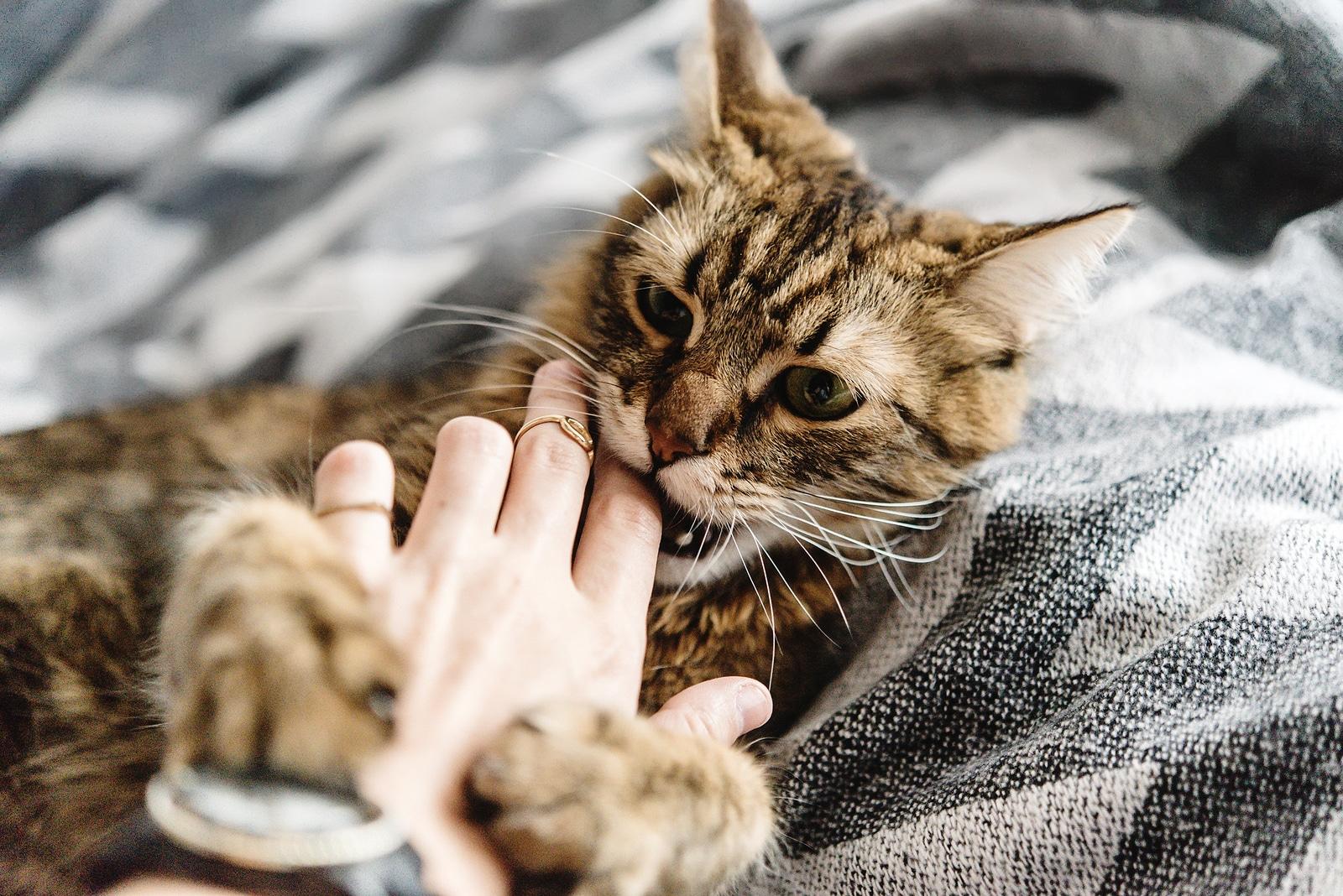
Don't yell to make a point. You don't speak the same language as your cat, so don't be fooled into thinking they will understand you better when you raise your voice. Of course, your cat may understand that the change in your volume means something is different, but yelling may scare your cat or call too much attention to negative behaviours. Yelling may cause your cat to feel stressed and anxious, which can cause additional misbehaviour.
Don't rub your cat's nose in an accident. The only thing you're going to accomplish by rubbing your cat's nose in the accident is upsetting them. You won't suddenly know their motivations for not using the litter box and they won't promise to never do it again. Rubbing your cat's nose in an accident brings more attention to the scene of the crime and may even reinforce to your cat that it's okay for them to go to the bathroom wherever they want. The best course of action is to simply clean the area thoroughly and continue to work on litter box training.
Don't allow aggressive play. You might think your sweet little kitten doesn't know better when they’re swatting or biting your fingers during play time. However, you know that biting and scratching isn't something you want an older cat to do in your home. With any new animal in your home, it's up to you to set early behavioural expectations. If your cat starts scratching or biting during playtime — even innocently — stop play immediately so your kitten understands what is and is not allowed. This is especially true for play with children. If you engage in play where you allow them to nibble on your finger, they might think it is okay to do so with children. This could cause the kids to become fearful of your cat, an adverse effect you do not want to happen.


Tasty Tips
Don't use a spray bottle. There is an old myth about using a spray bottle to redirect a cat's bad behaviour, but the truth is they likely don’t associate being sprayed with the bad behaviour. They are likely to stop doing what they are doing by running away from being sprayed, rather understanding the discipline is linked to their behaviour. This method can also cause your cat to become withdrawn at even the sight of a squirt bottle, and that is not something that you want to do.
The Dos of How to Discipline a Cat
Do reinforce good behaviours. Cats don't learn from punishment, but by praising them and sharing healthy treats you can teach them to recognise when they're doing something right. Make sure to reward your cat during the act of positive behaviour so that they can make the connection between their behaviour and the positive reinforcement.
Do stop immediately during "bad" behaviours. Disciplining your cat doesn't always have to be active. In fact, removing your attention from your cat may be one of the most effective methods for getting your point across and stopping negative behaviours such as biting, chewing and pouncing. Redirecting their attention to something else is a great way of reinforcing good behaviours and stopping bad behaviours. For instance, if your cat decides to start scratching on your couch, redirect them back to their scratching post.
Do consider your cat's health. Is your cat using the bathroom in some place other than their litter box? While kittens may take some time to learn the proper place to relieve themselves, older cats should know where to go. If your cat suddenly begins urinating or defecating in other areas of your home, make an appointment with their veterinarian. This change in behaviour can be symptomatic of a change in health, and your vet will be able to let you know if your cat's health is up to par. You certainly would never want to punish your cat for something that they cannot help. Work with your vet to get to the underlying cause of accidents in the home. If it is health related they can provide you with options to help get your cat healthy. If it is behavioural, they can provide you some additional tips on correcting the behaviour based on the interactions they've had with your cat in the past.
Do make changes to the environment. If you're trying to get your cat to stop clawing your leather couch or jumping on your tables, there are environmental changes you can make to get them to stop. For example, a baking tray placed on the edge of the table will crash to the ground when your cat hits it as they jump. A soft, silky blanket placed on your leather couch will make your cat slide down if they try to climb onto the cushions. Never make changes that could potentially harm them, but there are plenty of cat-safe methods on the internet to help you find ways to change your cat's behaviour.
The most important tip to remember in learning how to discipline a cat is to spend time, engage with them, and praise their good behaviours. While your cat may be independent, they still want a loving relationship with you.


Erin Ollila believes in the power of words and how a message can inform—and even transform—its intended audience. Her writing can be found all over the internet and in print, and includes interviews, ghostwriting, blog posts, and creative nonfiction. Erin is a geek for SEO and all things social media. She graduated from Fairfield University with an M.F.A. in Creative Writing. Reach out to her on Twitter @ReinventingErin or learn more about her at http://erinollila.com.
Related products
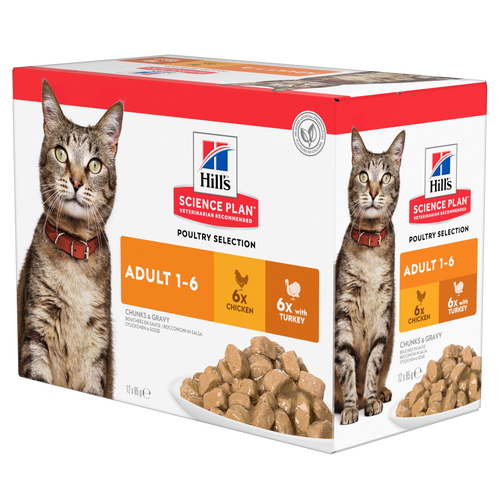

Tender chicken chunks in gravy for cats, with L-carnitine and fewer calories for ideal weight management. Packed with high-quality protein, omega-6s, and vitamin E for shiny fur and healthy skin.

Tender chicken chunks in gravy for mature adult cats. Made with easy-to-digest ingredients, high-quality protein for lean muscle maintenance and antioxidant vitamins C+E for optimal health.

Tender chunks in gravy for cats, with high-quality protein to maintain lean muscle. With vitamin E and omega-3s & -6s for healthy skin and balanced minerals to support healthy vital organs.
Related articles
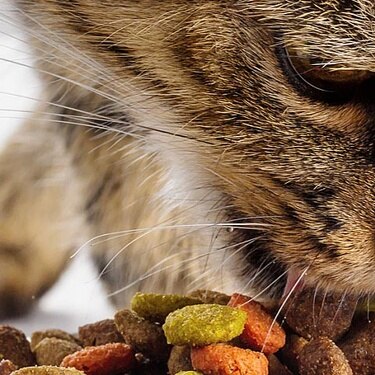
From essential vitamins & minerals to different types of meat, learn what to look for when choosing the best cat food for your feline.
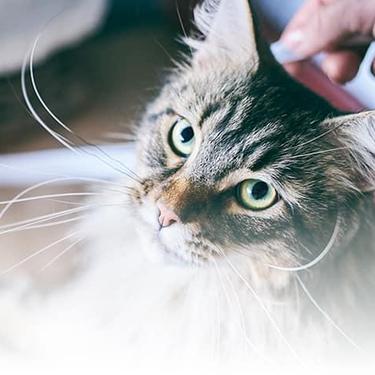
Learn how to make homemade cat treats that are healthy for your pet with this recipe from Hills Pet Nutrition.

There are three common ways to feed a cat. Each way has its advantages and disadvantages.
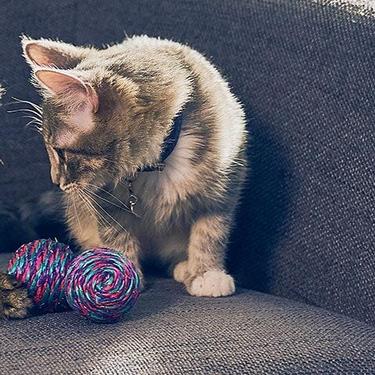
Kittens grow a lot in their first year, so it is important to provide them with the proper nutrients early, so they grow up healthy and strong. Learn more.

Put your cat on a diet without them knowing
Our low calorie formula helps you control your cat's weight. It's packed with high-quality protein for building lean muscles, and made with purposeful ingredients for a flavourful, nutritious meal. Clinically proven antioxidants, Vitamin C+E, help promote a healthy immune system.
Put your cat on a diet without them knowing
Our low calorie formula helps you control your cat's weight. It's packed with high-quality protein for building lean muscles, and made with purposeful ingredients for a flavourful, nutritious meal. Clinically proven antioxidants, Vitamin C+E, help promote a healthy immune system.

